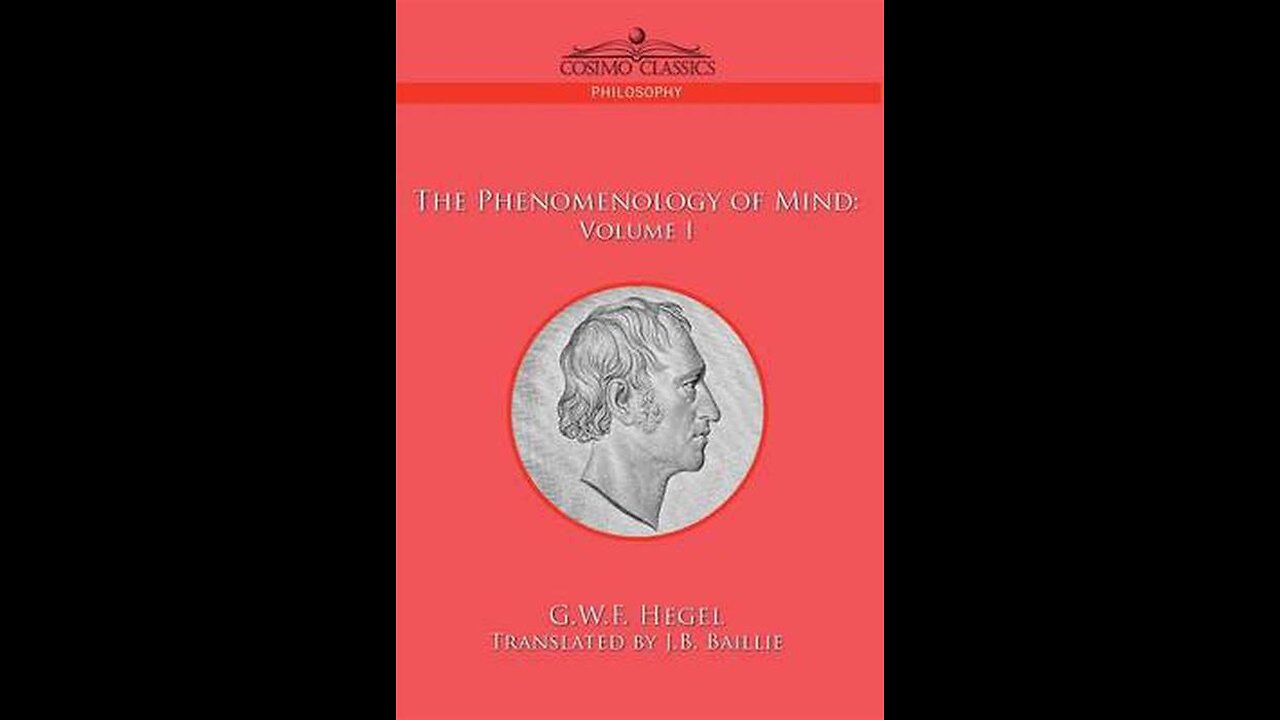Premium Only Content

The Phenomenology of Mind by G.W.F. Hegel | Summary and Critique
Buy Here: https://amzn.to/3WamCAG
"""The Phenomenology of Mind,"" also known as ""The Phenomenology of Spirit,"" is a philosophical work written by Georg Wilhelm Friedrich Hegel and published in 1807. It is considered one of Hegel's most important and influential works, outlining his philosophical system and exploring the development of consciousness and self-awareness.
The book is divided into various sections that trace the progression of consciousness from its initial stages to more complex forms of self-consciousness. Hegel's approach in ""The Phenomenology of Mind"" is dialectical, meaning that he analyzes concepts and ideas through a process of thesis, antithesis, and synthesis, in which contradictions are resolved to achieve a higher level of understanding.
Hegel begins by examining immediate sense-certainty and perception, highlighting their limitations and contradictions. He then moves on to discuss the struggle for recognition, where individuals seek acknowledgment and validation from others. This leads to the development of self-consciousness, which arises through the dialectical interaction between a self and other selves.
Hegel explores various forms of self-consciousness, including the master-slave dialectic, where individuals' identities are shaped through their relation to others. He argues that true self-consciousness can only be achieved through mutual recognition and the overcoming of conflicts.
Throughout the book, Hegel covers a wide range of topics, including morality, religion, art, and history. He explores the dialectical processes underlying these phenomena, examining how they shape consciousness and contribute to the development of human spirit.
Critique of ""The Phenomenology of Mind"" includes the following points:
1. Complexity and Difficulty: Hegel's writing style and his intricate philosophical system make ""The Phenomenology of Mind"" a challenging read. The book requires a deep engagement with Hegelian philosophy and may be inaccessible to readers unfamiliar with his concepts and terminology.
2. Ambiguity and Obscurity: Some critics argue that Hegel's ideas can be ambiguous and open to interpretation. His language and concepts are often abstract and difficult to grasp, leading to different interpretations and understandings of his work.
3. Teleological Approach: Critics contend that Hegel's teleological approach, in which history and human development are seen as progressing towards an ultimate goal or absolute knowledge, can be problematic. They argue that this teleology may oversimplify the complexities of history and human experience, neglecting contingencies and alternative paths of development.
4. Neglect of Individual Agency: Some critics claim that Hegel's emphasis on the collective and historical development of consciousness overlooks the role of individual agency and subjective experiences. They argue that the focus on dialectical processes may diminish the significance of individual autonomy and the complexities of personal identity.
5. Idealism and Neglect of Material Conditions: Critics argue that Hegel's idealistic approach gives primacy to ideas and consciousness, neglecting the material and socio-economic conditions that shape human existence. They contend that this idealism may downplay the significance of social structures and power dynamics in the development of consciousness.
Despite these critiques, ""The Phenomenology of Mind"" is considered a seminal work in the history of philosophy. Its exploration of consciousness, self-awareness, and the dialectical process has had a profound impact on subsequent philosophical and intellectual developments. The book continues to inspire and provoke debates within the field of philosophy and remains an important source for understanding Hegelian thought."
-
 2:41:49
2:41:49
Laura Loomer
4 hours agoEP99: Trump Dumps USAID As Leftists Panic!
6.9K2 -
 22:50
22:50
DeVory Darkins
8 hours ago $2.29 earnedDemocrats UNLEASH IMPEACHMENT on Trump
3.74K69 -
 1:17:34
1:17:34
Mike Rowe
5 hours agoA Masterclass In The Collapse Of Woke Culture With Anson Frericks
18.9K13 -
 17:51
17:51
Stephen Gardner
5 hours ago🔥YES!! Trump CUTS CORD on Democrats SECRET PROGRAM!
47.7K46 -
 2:16:49
2:16:49
TheSaltyCracker
5 hours agoMusk Destroys Gov't Money Pot ReeEEeE Stream 02-05-25
110K208 -
 1:10:59
1:10:59
FreshandFit
4 hours agoTop 3 Ways To Overcome A Break Up
43.4K4 -
 LIVE
LIVE
Akademiks
5 hours agoDrake Finally CUTS off FAKE FRIENDS in the Industry. VIOLATES KHALED, LEBRON! Announces album Feb14
2,837 watching -
 27:28
27:28
Glenn Greenwald
9 hours agoGlenn Reacts to Trump's Gaza Take Over: System Update Special
155K264 -
 2:13:49
2:13:49
Melonie Mac
5 hours agoGo Boom Live Ep 36!
79.4K9 -
 1:02:11
1:02:11
Sarah Westall
5 hours agoFreezing USAID & its Operations in Ukraine: A Massive Money Laundering Organization? w/ Sam Anthony
68.2K5